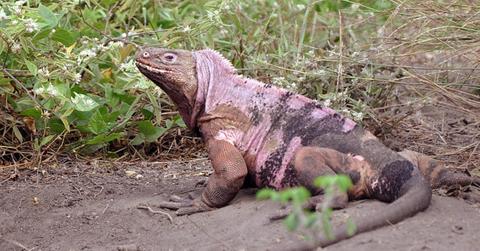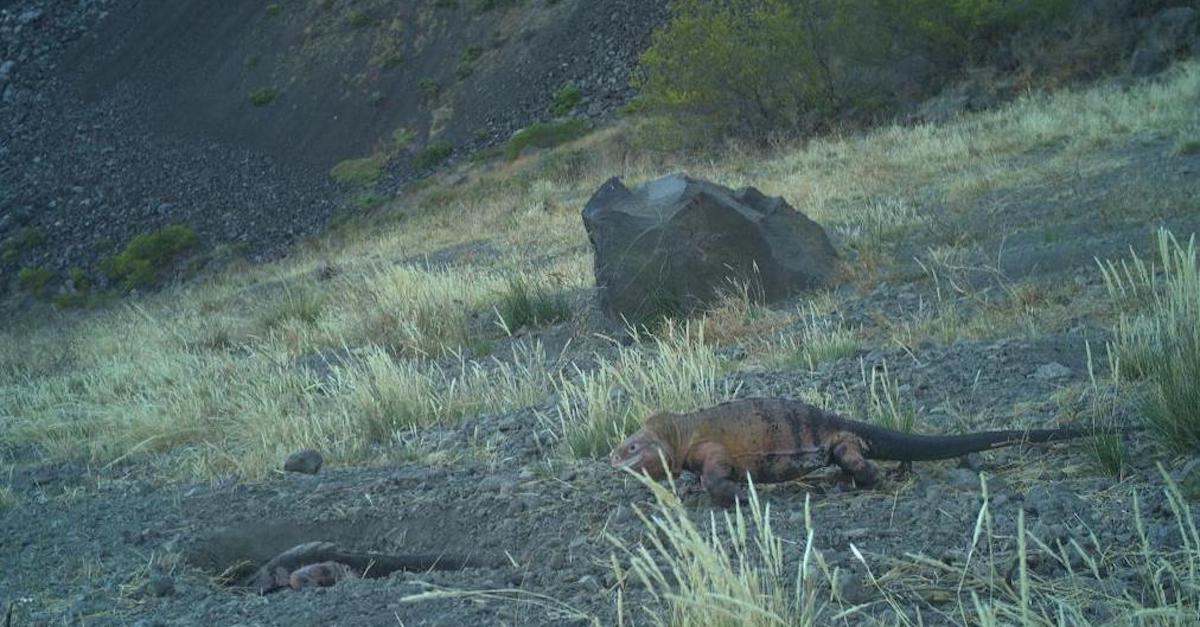Yes, Pink Iguanas Exist — Several Hatchlings Were Recently Discovered in the Galápagos
Published Dec. 22 2022, 2:36 p.m. ET
While your run-of-the-mill iguana isn't necessarily the most glamorous of creatures, that certainly isn't the case for the Galápagos Pink Iguana — the bubblegum pink reptile seriously speaks to all of our inner Barbie gals.
Unfortunately, the species is highly endangered, but environmentalists were thrilled when earlier this week, a group of several hatchlings were discovered on Isabela Island. This is a major win for conservationists working to save them.
"Joint expeditions by the Galápagos National Park Directorate (GNPD) and Galápagos Conservancy as part of 'Iniciativa Galápagos' have described the first-ever nesting area of the Pink Iguana and, nearby, photographed the first Pink Iguana hatchlings ever observed," an announcement from Galápagos Conservancy reads.
"These descriptions represent a breakthrough in knowledge about the species and identify a path forward for conservation actions to save the Pink Iguana from the verge of extinction."
“The discovery of the first ever nest and young Pink Iguanas together with evidence of the critical threats to their survival has also given us the first hope for saving this enigmatic species from extinction," Galápagos Conservancy's Paul Salaman also stated.
“And we’re so proud of our partnership with the Galápagos National Park that has yet again resulted in a huge stride forward towards saving the precious and unique biodiversity of Galápagos. Now our work begins to save the Pink Iguana.”
What to know about the recent discovery of Pink Iguana hatchlings on the Galápagos:
Although the Galápagos Pink Iguana's populations had been deteriorating, the species, which lives solely in the Galápagos on Isabel Island, is reproducing.
On Dec. 19, hatchlings were found for the first time since the species was discovered in the 1980s, according to CNN, on the highly remote slopes of Wolf Volcano. The species can stretch up to a foot and a half long, and as the name describes, they're an unusual bright pink hue.
While the Galápagos is largely untouched, the population is declining because of predators — specifically certain types of rodents, as well as feral cats that roam the iguana's living and nesting areas. But with increased monitoring, using hidden trail cameras, and an influx of research, it looks like they are finally making a comeback.
"This discovery marks a significant step forward, which allows us to identify a path going forward to save the Pink Iguana," director of the Galapagos National Park, Danny Rueda, stated via CNN. "Knowing all the aspects that make their existence vulnerable will allow us to take timely actions, mainly against invasive species and thus avoid interrupting the natural cycles of these fragile ecosystems."
Footage of the gorgeous animal, below.
Hopefully, the Galápagos Rewilding Project will work in the Pink Iguana's favor.
In August 2022, Leonardo DiCaprio and a group of conservationists launched the Galápagos Rewilding Project. With $43 million, the initiative aimed to maintain and restore the archipelago's gorgeous islands. And while the widely popular Floreana Island will be the main focus, the team hopes to restore 25 of the islands in the Galápagos region. Hopefully this will work in the Pink Iguana's favor.
“When I travelled to the Galápagos Islands, I met with Paula Castaño and other environmental heroes in Ecuador working day in and day out to save one of the most irreplaceable places on the planet. I’m excited to share her team’s work and to support the longstanding effort to protect and restore these iconic islands,” said Leonardo DiCaprio in a press release. "The environmental heroes that the planet needs are already here. Now we all must rise to the challenge and join them.”
That said, we're hoping to see more of these pink beauties as conservationist efforts continue.

